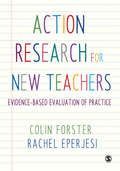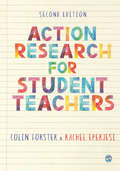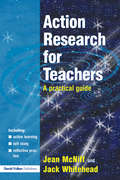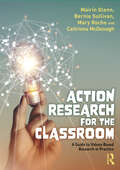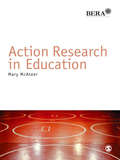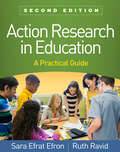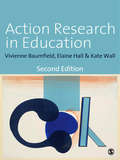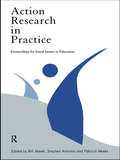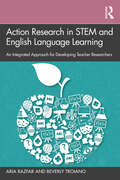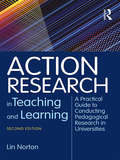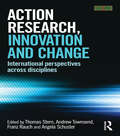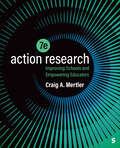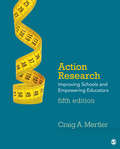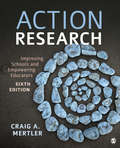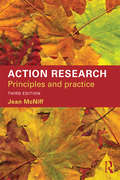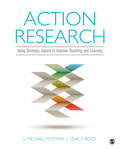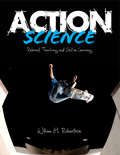- Table View
- List View
Action Research for New Teachers: Evidence-Based Evaluation of Practice
by Colin Forster Rachel EperjesiAction research is a popular part of many teacher training courses, but understanding how to do it well isn’t always straightforward. Action Research for New Teachers breaks the process down into small steps giving you concise, jargon-free guidance on all the issues and key considerations that you will need to tackle. It focuses on being evidence-based, encouraging you to produce evidence-rich research projects that are methodologically sound and stand up to scrutiny. This book takes you through the initial stages of planning and research design, engages with the complexities of data collection, and gives you advice on analyzing your data and writing up your research project.
Action Research for New Teachers: Evidence-Based Evaluation of Practice
by Colin Forster Rachel EperjesiAction research is a popular part of many teacher training courses, but understanding how to do it well isn’t always straightforward. Action Research for New Teachers breaks the process down into small steps giving you concise, jargon-free guidance on all the issues and key considerations that you will need to tackle. It focuses on being evidence-based, encouraging you to produce evidence-rich research projects that are methodologically sound and stand up to scrutiny. This book takes you through the initial stages of planning and research design, engages with the complexities of data collection, and gives you advice on analyzing your data and writing up your research project.
Action Research for Student Teachers
by Colin Forster Rachel EperjesiAction research is a popular part of many teacher training courses but understanding how to do it well is not always straightforward. Previously known as Action Research for New Teachers, this book will guide you through each step of the process, from initial stages of planning and research, through to how to analyse your data and write up your research project. This second edition includes: · A new ‘Critical task’ feature, with suggested responses · Discussion of where action research ‘fits’ in the word of education research · Exploration of the skills and attributes needed for undertaking action research · Guidance on how to write with clarity and purpose.
Action Research for Student Teachers
by Colin Forster Rachel EperjesiAction research is a popular part of many teacher training courses but understanding how to do it well is not always straightforward. Previously known as Action Research for New Teachers, this book will guide you through each step of the process, from initial stages of planning and research, through to how to analyse your data and write up your research project. This second edition includes: · A new ‘Critical task’ feature, with suggested responses · Discussion of where action research ‘fits’ in the word of education research · Exploration of the skills and attributes needed for undertaking action research · Guidance on how to write with clarity and purpose.
Action Research for Teachers: A Practical Guide
by Jack Whitehead Jean McNiffAssuming no prior knowledge of research methods and techniques, this book is the perfect companion for teachers at all levels undergoing professional development who need to enhance their formal reflection skills. Providing a detailed explanation of what action research is and its importance in terms of whole school development, this book invites the teachers to try out educational research for themselves and adopt an investigative attitude that will help improve and evaluate practice. It includes: * Support and guidance that help you tackle key issues * "Real-life" practical case studies that underline what action research is and how it can be effectively used.
Action Research for the Classroom: A Guide to Values-Based Research in Practice
by Caitriona McDonagh Mary Roche Bernie Sullivan Máirín GlennWhat is action research? Why does it matter in education? This practical and accessible book provides answers to these questions, guiding readers through a meaningful and manageable approach to research in practice. Readers will benefit from guidance on easing the stress of research projects in teacher education courses, professional development initiatives and in school self-evaluation. Supported by case studies from teachers’ and student teachers’ practice, chapters guide readers through key aspects of carrying out a research project, including: planning a research project collecting and using data presenting evidence generating theory writing up and disseminating your research a theoretical rationale to show why the research is conducted in this way Written in an accessible manner by experienced classroom teachers and academic researchers, this is an essential read for those conducting research on their own practice as part of their professional learning. Action Research for the Classroom shows how teacher research is drawn from the reality of busy life in the classroom and that it can be undertaken in the most complex learning environments, creating positive change for teaching and learning.
Action Research in Education (BERA/SAGE Research Methods in Education)
by Mary Mcateer'This structured and accessible book, with excellent case studies, will give confidence to anyone embarking on an action research project'-Professor Ken Jones, Dean of Humanities, Swansea Metropolitan University 'Masterly in its lucidity, this text contextualises Action Research in the fiedl of Education Practice; and is therefore a valuable resource in both professional learning and improved professional practice'-Effie Maclellan, Research Professor in Education, University of Strathclyde, Glasgow 'An engaging, clearly written, and helpfully structured articulation of how AR can be implemented and practised in order to make a difference within educational contexts'-Dr Stephen Parker, University of Worcester 'Will assist practitioner researchers to develop a profound and critical understanding of this approach'-Professor Marion Jones, Liverpool John Moores University This hands-on and user-friendly book uses illustrative case studies to demonstrate and explore the potential for change in real social situations. This book seeks to assert the academic integrity of action research and to de-mystify the process. Each chapter includes: - a 'how to' section based on concrete examples and dilemmas - commentary that relates examples to the broader field - a discussion of the underlying theoretical approach - discussion and exploration of quality issues - discussion of ethical and pragmatic decision-making The mix of theoretical grounding and focus on real issues will be of benefit to Master's level or advanced undergraduate students on Education and Research Methods courses or those undertaking Action Research as part of professional development activities. Mary McAteer is Director of the Mathematics Specialist Teacher (MaST) programme at Edge Hill University Research Methods in Education series: Each book in this series maps the territory of a key research approach or topic in order to help readers progress from beginner to advanced researcher. Each book aims to provide a definitive, market-leading overview and to present a blend of theory and practice with a critical edge. All titles in the series are written for Master's-level students anywhere and are intended to be useful to the many diverse constituencies interested in research on education and related areas. Other books in the series: - Using Case Study in Education Research -Qualitative Research in Education, Atkins and Wallace - Ethnography in Education, Mills and Morton For more about the series and additional resources visit the BERA/SAGE series page here.
Action Research in Education, Second Edition: A Practical Guide
by Sara Efrat Efron Ruth RavidAcclaimed as a text and professional development tool, this user-friendly resource has now been revised and updated, and offers expanded coverage of collaborative action research (CAR) and participatory action research (PAR). Preservice and inservice educators get crucial step-by-step guidance for conducting classroom- and school-based studies to improve their instructional practices. Organized to mirror the full cycle of action research, the book provides balanced coverage of qualitative, quantitative, and mixed methods approaches. Vivid vignettes and examples illustrate research approaches for a range of teaching and learning situations, school subjects, and age groups (PreK–12). Readers learn how research approaches are driven by the research question, as well as how to develop data collection strategies; design and/or evaluate assessment tools; interpret, analyze, report, and implement study results; and design a new cycle of research that builds on the previous one. New to This Edition *In-depth descriptions of CAR and PAR--which enable groups of teachers to work together to solve problems in a classroom or school--plus examples of both throughout the book. *Expanded or new discussions (with examples) of such topics as how research approaches and methods are driven by the research question, how to assess different types of reliability and validity, the differences between analysis and interpretation, and how to use sequential cycles of research for continuous improvement and professional development. *Fully updated references and resources. Pedagogical Features *Both individual and group exercises and activities in every chapter. *New and updated checklists and guidelines that enable busy educators to self-assess the progress and quality of their studies. *Sample templates to assist in development of research instruments. *Example boxes illustrating the components of an action research report. *Summary tables highlighting key aspects of different research strategies. *Chapter summaries (now shorter for ease of use) and suggestions for further reading.
Action Research in Education: Learning Through Practitioner Enquiry
by Elaine Hall Kate Wall Vivienne Marie BaumfieldAction Research in Education is an essential guide for any lecturer, teacher or student-teacher interested in doing research. This exciting new edition of a popular text is an important resource for any education professional interested in investigating learning and teaching. Building on the success of Action Research in the Classroom, the authors have revised, updated and extended this book to include examples from further and higher education. It maps out easy-to-follow steps for usefully applying an action research approach and is full of practical tips and examples of real practitioner research projects from a range of schools, colleges and universities. This book will help teachers to: - understand and apply practitioner inquiry - enhance their problem-solving skills - locate their own activity in a wider context - maximise opportunities to develop practice - evaluate the needs of their learners Clear, pragmatic and timely, this is a must-have text for all teachers and students of education. Vivienne Baumfield is Professor of Pedagogy, Policy and Innovation in the School of Education, University of Glasgow Elaine Hall is Lecturer in Research Methods, School of Education, Communication and Language Sciences, Newcastle University Kate Wall is Senior Lecturer in the School of Education, Durham University
Action Research in Practice: Partnership for Social Justice in Education
by Stephen Kemmis Bill Atweh Patricia WeekThis book presents a collection of stories from action research projects in schools and a university. This collection is more than simply an illustration of the scope of action research in education - it shows how projects that differ on a variety of dimensions can raise similar themes, problems and issues. The book begins with theme chapters discussing action research, social justice and partnerships in research. The case study chapters cover topics such as: * school environment - how to make a school a healthier place to be * parents - how to involve them more in decision-making * students as action researchers * a state system - a collaborative effort between university staff and a state education department * gender - how to promote gender equity in schools * improving assessment in the social sciences * staff development planning * doing a PhD through action research * writing up action research projects.
Action Research in STEM and English Language Learning: An Integrated Approach for Developing Teacher Researchers
by Aria Razfar Beverly TroianoResponding to the linguistic and cultural diversity of the U.S. K–12 student population and an increasing emphasis on STEM, this book offers a model for professional development that engages teachers in transformative action research projects and explicitly links literacy to mathematics and science curriculum through sociocultural principles. Providing detailed and meaningful demonstrations of participatory action research in the classroom, Razfar and Troiano present an effective, systemic approach that helps preservice teachers support students’ funds of knowledge. By featuring teacher and researcher narratives, this book centers teacher expertise and offers a more holistic and humanistic understanding of authentic and empathetic teaching. Focusing on integrating instructional knowledge from ESL, bilingual, and STEM education, the range of cases and examples will allow readers to implement action research projects in their own classrooms. Chapters include discussion questions and additional resources for students, researchers, and educators.
Action Research in Teaching and Learning: A Practical Guide to Conducting Pedagogical Research in Universities
by Lin NortonPractical and down-to-earth, the second edition of Action Research in Teaching and Learning is an ideal introduction to the subject, offering a distinctive blend of the theoretical and the practical, grounded firmly in the global higher education landscape. Written in an accessible style to build confidence, it provides easily adaptable, practical frameworks, guidelines and advice on research practice within a higher education context. The reader is guided through each stage of the action research process, from engaging with the critical theory, to the practical applications with the ultimate goal of providing a research study which is publishable. Supplemented by useful pedagogical research tools and exemplars of both qualitative and quantitative action research studies, this new edition features chapters engaging with teaching excellence and analysing qualitative and quantitative research, additions to the resources section and a new preface focusing more explicitly on the ever-growing number of part-time academics. Action Research in Teaching and Learning combines a theoretical understanding of the scholarly literature with practical applications and is an essential, critical read for any individual teaching or undertaking action research.
Action Research, Innovation and Change: International perspectives across disciplines
by Thomas Stern Franz Rauch Angela Schuster Andrew TownsendAction research continues to see a growth in interest both internationally and across disciplines. This book demonstrates the diversity in settings and focus for action research and provides a guide to its core aspiration: to achieve principled change. Written by authors from a range of countries and range of disciplines (including education, health care, palliative care, social work and community development), this book answers these key questions: How can action research be used to achieve principled change? How has action research been applied in various disciplines and in different countries? What can be learnt about the conduct of action research from these diverse settings? By means of detailed case studies of successful projects and discussions that challenge and raise theoretical questions, this book explores some of the contemporary cutting edge applications and conceptualisations of action research. Action research paves the way for the empowerment of people involved in social action, and the examples of successful change processes that are the core of this book will prove inspirational and provide practical advice. Written by a range of leading international researchers in the field, this book will define the future for action research for years to come.
Action Research: Improving Schools and Empowering Educators
by Craig A. MertlerAction Research: Improving Schools and Empowering Educators, Seventh Edition serves as a comprehensive guide on action research for both beginning and experienced educators. Instead of focusing on theoretical aspects of research, the book provides detailed yet practical information guiding readers step-by-step through the iterative process of action research in a classroom or school-based context. The text adopts a highly sequential manner, beginning with topic conceptualization, reviewing related research, designing the study, executing the investigation, developing an action plan, and ultimately disseminating and reflecting on the results. A distinguishing feature of this book is the integration of numerous relatable examples, hands-on exercises, case studies, and explorations of published action research entries to ensure material comprehension. Each chapter of this Seventh Edition has been updated with a new Action Research Case Study, featuring the move to virtual instruction for the COVID-19 pandemic and beyond. Throughout, the author has added more on alternative strategies for disseminating research and expanded discussion of research topics, problems, questions, data, and analysis. Additionally, the entire book has also been updated for the Seventh Edition of the Publication Manual of the American Psychological Association to be current with the latest best practices in research. Included with this title: LMS Cartridge: Import this title’s instructor resources into your school′s learning management system (LMS) and save time. Don′t use an LMS? You can still access all of the same online resources for this title via the password-protected Instructor Resource Site. Select the Resources tab on this page to learn more.
Action Research: Improving Schools and Empowering Educators
by Craig A. MertlerAction Research: Improving Schools and Empowering Educators, Seventh Edition serves as a comprehensive guide on action research for both beginning and experienced educators. Instead of focusing on theoretical aspects of research, the book provides detailed yet practical information guiding readers step-by-step through the iterative process of action research in a classroom or school-based context. The text adopts a highly sequential manner, beginning with topic conceptualization, reviewing related research, designing the study, executing the investigation, developing an action plan, and ultimately disseminating and reflecting on the results. A distinguishing feature of this book is the integration of numerous relatable examples, hands-on exercises, case studies, and explorations of published action research entries to ensure material comprehension. Each chapter of this Seventh Edition has been updated with a new Action Research Case Study, featuring the move to virtual instruction for the COVID-19 pandemic and beyond. Throughout, the author has added more on alternative strategies for disseminating research and expanded discussion of research topics, problems, questions, data, and analysis. Additionally, the entire book has also been updated for the Seventh Edition of the Publication Manual of the American Psychological Association to be current with the latest best practices in research. Included with this title: LMS Cartridge: Import this title’s instructor resources into your school′s learning management system (LMS) and save time. Don′t use an LMS? You can still access all of the same online resources for this title via the password-protected Instructor Resource Site. Select the Resources tab on this page to learn more.
Action Research: Improving Schools and Empowering Educators
by Dr Craig A. MertlerCraig Mertler’s Action Research: Improving Schools and Empowering Educators introduces practicing educators to the process of conducting classroom-based action research. Practical and comprehensive, the book focuses on research methods and procedures that educators can use in their everyday practice. This Fifth Edition adds enhanced coverage of rigor and ethics in action research, means of establishing quality of both quantitative and qualitative data, as well as strengthened pedagogical features. New material includes discussions of social justice advocacy as an application of action research and the inclusion of abstracts in research reports.
Action Research: Improving Schools and Empowering Educators
by Dr Craig A. MertlerCraig Mertler’s Action Research: Improving Schools and Empowering Educators introduces practicing educators to the process of conducting classroom-based action research. Practical and comprehensive, the book focuses on research methods and procedures that educators can use in their everyday practice. This Fifth Edition adds enhanced coverage of rigor and ethics in action research, means of establishing quality of both quantitative and qualitative data, as well as strengthened pedagogical features. New material includes discussions of social justice advocacy as an application of action research and the inclusion of abstracts in research reports.
Action Research: Improving Schools and Empowering Educators
by Dr. Craig A. MertlerAction Research: Improving Schools and Empowering Educators introduces both novice and experienced practicing educators to the process of designing and conducting classroom-based action research in order to make their instructional practices more effective. This practical text focuses on the research methods and procedures that educators can use in their everyday instructional practices, classroom activities, and school procedures. Using over 20 years of teaching experience, author Craig A. Mertler provides insightful coverage of the knowledge and skills needed to design research studies, conduct research, and communicate findings to relevant stakeholders.
Action Research: Improving Schools and Empowering Educators
by Dr. Craig A. MertlerAction Research: Improving Schools and Empowering Educators introduces both novice and experienced practicing educators to the process of designing and conducting classroom-based action research in order to make their instructional practices more effective. This practical text focuses on the research methods and procedures that educators can use in their everyday instructional practices, classroom activities, and school procedures. Using over 20 years of teaching experience, author Craig A. Mertler provides insightful coverage of the knowledge and skills needed to design research studies, conduct research, and communicate findings to relevant stakeholders.
Action Research: Principles and practice
by Jean McNiffSince its first publication, Action Research: Principles and Practice has become a key text in its field. This new updated edition clearly describes and explains the practices of action research and its underlying values, and introduces important new ideas, including: all professionals should be reflective practitioners; they should produce their personal theories of practice to show how they are holding themselves accountable for their educational influences in learning; the stories they produce become a new people’s history of action research, with potential for influencing new futures. This new edition has expanded in scope, to contribute to diverse fields including professional development across the sectors and the disciplines. It considers the current field, including its problems as well as its considerable hopes and prospects for new thinking and practices. Now fully updated, this book contains: A wealth of case-study material New chapters on the educational significance of action research An overview of methodological and ethical discussion The book is a valuable addition to the literature on research methods in education and nursing and healthcare, and professional education, and contributes to contemporary debates about the generation and dissemination of knowledge and its potential influence for wider social and environmental contexts. Practitioners across the professions who are planning action research in their own work settings will find this book a helpful introduction to the subject while those studying on higher degree courses will find it an indispensable resource.
Action Research: Using Strategic Inquiry To Improve Teaching And Learning
by S. Michael Putman Tracy C. RockAction Research: Using Strategic Inquiry to Improve Teaching and Learning is a core text for the Action Research course in Education. The proposed text seeks to address the needs of practitioners as it will be primarily written for use within a graduate level action research class. It will be oriented towards proactive planning as part of an organized, efficient process for developing and conducting an action research study. The book will be organized around implementation of the action research process using self-regulatory principles, which is characterized by four phases: task definition, goal setting and planning, enacting, and adapting. These four phases will be addressed as the learner considers what action research encompasses and a topic to be studied, then proceeds to establish a plan and enact it. This overall process is organized as can be seen in the Table of Contents. Michael Putnam and Tracy Rock will highlight methods and processes that incorporate formative data that is readily available to teachers, facilitating associations between classroom instruction and the action research process. The text will also reinforce how action research can improve the teaching and learning process by reinforcing or changing perceptions about the use of informal data, including anecdotal notes or observations, in the research process.
Action Research: Using Strategic Inquiry to Improve Teaching and Learning
by S. Michael Putman Tracy C. RockAction Research: Using Strategic Inquiry to Improve Teaching and Learning helps educators use research to guide decision-making and determine the effectiveness of various instructional strategies. The book leads the reader through the action research process using a model of self-regulation, which focuses on task definition, goal setting and planning, enacting research, and adaption. Written specifically for educators who may not feel prepared to measure the impact of interventions on student learning outcomes, the book provides very practical and useful tools, containing specific examples that are relevant to teachers’ everyday reality. The text also reinforces how action research can improve the teaching and learning process by reinforcing or changing perceptions about the use of informal data, including anecdotal notes or observations, in the research process.
Action Research: Using Strategic Inquiry to Improve Teaching and Learning
by S. Michael Putman Tracy C. RockAction Research: Using Strategic Inquiry to Improve Teaching and Learning is a core text for the Action Research course in Education. The proposed text seeks to address the needs of practitioners as it will be primarily written for use within a graduate level action research class. It will be oriented towards proactive planning as part of an organized, efficient process for developing and conducting an action research study. The book will be organized around implementation of the action research process using self-regulatory principles, which is characterized by four phases: task definition, goal setting and planning, enacting, and adapting. These four phases will be addressed as the learner considers what action research encompasses and a topic to be studied, then proceeds to establish a plan and enact it. This overall process is organized as can be seen in the Table of Contents. Michael Putnam and Tracy Rock will highlight methods and processes that incorporate formative data that is readily available to teachers, facilitating associations between classroom instruction and the action research process. The text will also reinforce how action research can improve the teaching and learning process by reinforcing or changing perceptions about the use of informal data, including anecdotal notes or observations, in the research process.
Action Science: Relevant Teaching and Active Learning
by William H. RobertsonPut student engagement on the fast-track Think action sports like skateboarding and BMX have nothing to do with physical science? Think again, especially as they relate to fundamental physics concepts like motion, force, and simple machines—not to mention the problem solving required. What’s more, because kids will want to, observing action sports is a perfect vehicle for promoting self-directed and collaborative learning . . . with Action Science as your driver’s manual. Through a combination of book and video, Bill Robertson provides all the materials you’ll need to get started, with the NGSS very much in full view. Inside and outside, you’ll find: Detailed instructional methods on momentum, center of gravity, inertia, and centrifugal and centripetal forces Hands-on classroom activities and experiments, including some utilizing common household materials Captivating video via QR codes of top professional and amateur extreme sports athletes demonstrating authentic, high-flying maneuvers Robertson, an associate professor in science and technology education at the University of Texas at El Paso--and an avid skateboarder—has extensively piloted the Action Science program. It works! "This is an outstanding resource for any middle school science teacher trying to engage unmotivated students or implement problem-based learning strategies in a way that is exciting and meaningful!" --Melissa Miller, Middle School Science Teacher Lynch Middle School Farmington, AR
Action Science: Relevant Teaching and Active Learning
by William H. RobertsonPut student engagement on the fast-track Think action sports like skateboarding and BMX have nothing to do with physical science? Think again, especially as they relate to fundamental physics concepts like motion, force, and simple machines—not to mention the problem solving required. What’s more, because kids will want to, observing action sports is a perfect vehicle for promoting self-directed and collaborative learning . . . with Action Science as your driver’s manual. Through a combination of book and video, Bill Robertson provides all the materials you’ll need to get started, with the NGSS very much in full view. Inside and outside, you’ll find: Detailed instructional methods on momentum, center of gravity, inertia, and centrifugal and centripetal forces Hands-on classroom activities and experiments, including some utilizing common household materials Captivating video via QR codes of top professional and amateur extreme sports athletes demonstrating authentic, high-flying maneuvers Robertson, an associate professor in science and technology education at the University of Texas at El Paso--and an avid skateboarder—has extensively piloted the Action Science program. It works! "This is an outstanding resource for any middle school science teacher trying to engage unmotivated students or implement problem-based learning strategies in a way that is exciting and meaningful!" --Melissa Miller, Middle School Science Teacher Lynch Middle School Farmington, AR
